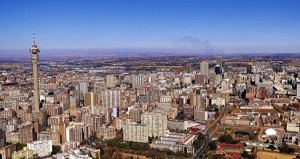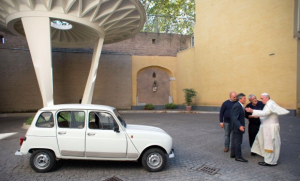 I am in my last day in Johannesburg, South Africa, having attended a linguistics conference here for the past week. It’s been a fascinating experience, both attending presentations at the conference and experiencing South Africa for the first time. The language situation in South Africa is complex. There are 11 official languages (versus just 2 in the Apartheid days, English and Afrikaans – derived from Dutch). The fascinating fact for me is that virtually everyone here speaks English, but it is rare that it is anyone’s native tongue. Most likely it is the second language (for white Afrikaans speakers) or the second or third language (for black South Africans). Many South Africans speak more then two languages, especially Blacks, who often speak their home language (such as Xhosa or Sotho) and also English and possibly also one or both of the other two languages which have a lingua franca function here, namely Afrikaans and Zulu. In one presentation today it was mentioned that adult Blacks do not necessarily view their native language as their best language – that might be English or Afrikaans, languages which are vital for success in higher education and in the professional world.
I am in my last day in Johannesburg, South Africa, having attended a linguistics conference here for the past week. It’s been a fascinating experience, both attending presentations at the conference and experiencing South Africa for the first time. The language situation in South Africa is complex. There are 11 official languages (versus just 2 in the Apartheid days, English and Afrikaans – derived from Dutch). The fascinating fact for me is that virtually everyone here speaks English, but it is rare that it is anyone’s native tongue. Most likely it is the second language (for white Afrikaans speakers) or the second or third language (for black South Africans). Many South Africans speak more then two languages, especially Blacks, who often speak their home language (such as Xhosa or Sotho) and also English and possibly also one or both of the other two languages which have a lingua franca function here, namely Afrikaans and Zulu. In one presentation today it was mentioned that adult Blacks do not necessarily view their native language as their best language – that might be English or Afrikaans, languages which are vital for success in higher education and in the professional world.
There was a presentation today by a Swiss linguist, who reported on language issues in health care in Switzerland. She started off by mentioning that her country also has multiple official languages (German, French, Italian, Romantsch). At the end of her talk there was a question from a South African in the audience, asking why, if Switzerland were multilingual like South Africa, there was any need for interpreters or other assistance in health care. She was assuming that the situation was analogous to multilingual South Africa, where it’s the norm to speak multiple languages, and, if possible, to learn to speak (although not necessarily to read or write) all the languages used widely in your region. The Swiss linguist was somewhat taken aback by the question and responded that while there are multiple official languages, they are not all spoken throughout the country but rather are limited to particular geographic regions. Many Swiss within those regions speak only their native tongue (and often school English).
Maybe the South Africans learn more languages because they’re more open and approachable. One South African linguist at the conference reported an anecdote of a woman in a township being asked why she was learning an additional African language (her 4th or 5th language) – she responded that it would be rude not to be able to speak to her new neighbor who spoke that language.

